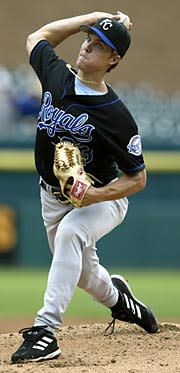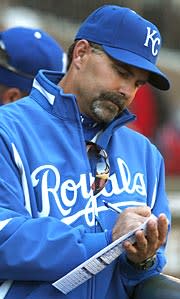Greinke's redemption and pursuit of perfection
Guacamole is on
mind. He enjoys guacamole, unless it's chunky. He doesn't like avocados, actually, and when his fiancée told him that doesn't make any sense, he shrugged his shoulders. Guacamole is of paramount importance to the best pitcher in the American League because his favorite burrito place just raised the price by 30 cents.
"I like the guacamole," Greinke said. "Now, I don't really love the guacamole. So I get it when I feel like it. They changed their guacamole from $1.50 to $1.80. I mean, $1.50 is already pretty darn high. So they changed it to $1.80, and I'll never again get guacamole."
It's brought to Greinke's attention that he just signed a $38 million contract to pitch for the Kansas City Royals well into the next decade. The team and Greinke's agent haggled for weeks over the terms before hammering them out in one day, which doesn't make sense to him, either. "Why can't they go in the room the first time and do it?" he asked, before getting back to the subject at hand.
"It's not about the guacamole itself," Greinke said. "I just don't want to let them win."

Zack Greinke is 4-0 with a 0.00 ERA in 2009.
(Al Messerschmidt/Getty Images)
It is always a battle with Greinke: him and the batter, him and his friends, him and himself. And, on this day, him and the person trying to understand how the mind that's currently occupied with guacamole operates.
"You're not allowed to write about me if you haven't seen 'The Shawshank Redemption,' " Greinke said. "See it, and then get back to me."
The genius thing always bothered him. Greinke is not some pitching genius, and he never was, even if executives and coaches and teammates and columnists said so. He is gifted. He can throw a baseball wherever he damn well pleases, high or low, inside or outside, fast or slow, his arm a sniper's rifle.
"That didn't make me smart," Greinke said. "All I knew was that glove's here, I was supposed to throw it there and I could every time. And people said how smart I was. It used to make me mad. Just because I could execute it, everyone thought I was a genius. No. I had no idea what I was doing. I could throw it wherever you called it, wherever you wanted it, anytime, and that was that."
Brilliant or blessed, it doesn’t really matter when it’s the cusp of May and you’ve yet to give up an earned run. That was Greinke's fortune – three perfect goose eggs, a 0.00 ERA – before Toronto touched him up for a pair of runs in seven innings Wednesday, bumping him to 0.50. What remains is simple: Five years after stardom beckoned Greinke, he’s finally answering.
In 2004, Greinke introduced himself to the baseball world, and it was smitten. He flung curveballs at 50 mph. He had the audacity to sneak a quick pitch past
He talked in an aloof manner and monotonous cadence, and it was difficult to tell whether he was ironically profound or a 20-year-old with a porous filter between brain and lips.
"I'm never surprised by anything that comes out of his mouth," said Don Greinke, his father, who watched his son leap to the major leagues less than two years after the Royals drafted him with the sixth overall pick out of suburban Orlando. "He's very candid."
And yet all of his teammates noticed something curious about Greinke: For being so forthright, he was also quiet. Oddly so. He kept to himself in the clubhouse and didn't go out on the road. Conversations with him never lasted too long and sometimes ended with an awkward goodbye. The Royals figured this was all overwhelming, and so as not to burden him with living alone, they set him up with Hall of Famer George Brett.

Greinke was named Royals Pitcher of the Year in 2004.
(Tom Pidgeon/Getty Images)
Greinke lived in an extra room at Brett's house. He slept late, spent some afternoons by the pool at a local country club and others fishing on nearby lakes, went to the ballpark, returned home to play Xbox and went to bed. This was his life.
"On the outside, he didn't have a worry in the world," Brett said. "Though who knows what anybody's like inside?"
He carried the secret for years. Zack Greinke, pitching wunderkind, hated pitching. His gift was his curse.
Greinke wanted to play shortstop. He loathed the time between starts. It allowed him to wallow in his sorrow. He didn't know why he was so sad. He just was. He nearly quit before the Royals summoned him in '04. Greinke placed dozens of calls to his parents and said he was done. One time, when the Royals told him he'd skip a start and sit for an entire 10-day trip with Triple-A Omaha, Greinke panicked. He packed his bags once and planned on driving to Dallas, where his girlfriend, Emily Kuchar, was a Cowboys cheerleader. He told the Royals he'd like to take a short vacation.
"But that wasn't really what I was thinking," Greinke said. "I thought I was going to go there for a few days, and then go home, and then go to college and start over."
They told him to be patient. He'd join the major league team soon. Greinke figured that a salve. He'd learn from the best. He loves learning. He watched "The Wire" because it taught him about things he didn't know, cops and drugs and politics, and he'd watch his teammates and understand how to carry himself.
Down the row of lockers from Greinke's along the left side of the Royals' clubhouse was
He smiled at TV cameras. He joked with teammates in English and Spanish. One day, Greinke walked up to Sweeney with a question.
"How are you so good at faking it?" he asked.
"Faking what?" Sweeney said.
Greinke didn't understand.
"Sweeney came in here every day with a good attitude, and I thought he was just putting up a face," he said. "He'd say he's not. Every day, I'd have to motivate myself to go in there. And once I got to the field, I would lose the motivation eventually and have to get it back again. If anything wrong happened at all, I'd lose it, and not just barely lose it. I'd lose it to the bottom."
Whatever ate at Greinke, it did so like a piranha, vicious and indiscriminate and in tiny bites that made his descent slow and painful. He survived his first season, won Royals Pitcher of the Year and finished fourth in Rookie of the Year voting. The next season was a disaster. Greinke went 5-18. He spent so much energy digging himself from his malaise, pitching was like another job.
"At the end of the day, I was so mad," Greinke said. "Because I didn't give it my 100 percent best for baseball. But then there was no way I could focus on baseball without the misery being that much worse."
The next spring, the discomfort worsened. Greinke couldn't spend time in the clubhouse without panicking. He did extra exercises and weightlifting at home because he couldn't stand being at the Royals' complex. On Feb. 25, during a bullpen session, catcher
noticed Greinke throwing harder than usual. Each pitch sizzled more than the previous. They got progressively wild.
Everything was coming out, finally. Years of frustration and sickness, there for everyone to see one cathartic morning that would either ruin or save his career.
Allard Baird, the Royals' general manager, was staring at a 22-year-old who had just suffered a mental breakdown. Greinke had been whisked off the mound, first to manager Buddy Bell's office, then to Baird's. Both were like trauma doctors. Handle this right and the patient survives. Make the wrong decision, no matter how well-intentioned, and the consequences are disastrous.
"In this game, business always wins out over personal," said Baird, now a top scout with Boston. "But in this case, you had to look at the person ahead of the player. It was the right thing to do."
He and Bell told Greinke to go home and seek help. Something was wrong with him, and they wouldn't ask him to fight through it. He had tried to long enough.
Doctors diagnosed Greinke with social anxiety disorder and accompanying depression. Greinke's family had a history of depression, and spending time at the ballpark triggered his.
"We had to understand what was going on," said Don, his father. "To us, it wasn't normal for him to feel that way. Every day was a challenge. I just listened to him and tried to understand what I heard. From deep down how he felt."
At first, relieved. No more baseball meant the walls no longer caved in on him daily. Then Greinke started taking antidepressants and found the ones that best balanced his brain's chemistry. Slowly baseball began to look different. He missed it.
His gift – he couldn't waste it, not now. Gone was the fog. He lived in standard definition before, and all of a sudden, life was HD.
"Now that I had the medicine to take away a lot of the distractions I used to have," Greinke said, "it was so easy to do it like a normal person with a normal perspective instead of having to completely overcome something.
"The medicine doesn't help my pitching one bit. It's just being able to get my mind right before I pitch. Before, I could throw it where I wanted to. I always worked real hard when I wasn't on the field. Now I can do it and relax off the field."
After two months in Arizona at extended spring training, Greinke went to Double-A Wichita in June. He asked to pitch in relief, and the Royals complied. Greinke felt more like an everyday player, the possibility of pitching always present, and he had this notion that he'd learn to throw harder coming out of the bullpen. The fastball that sat at 90 mph two years earlier suddenly crackled at 96, 97, even 98.
Wichita made the playoffs, and Greinke said his fondest memory in baseball isn't his first major league victory or first shutout or even his first home run. It was those four months of winning in Central Kansas.
When the minor league season ended, the Royals summoned Greinke. In February, he'd been their future, their franchise, their opening-day starter. He finished his year with three innings of middle relief Sept. 29. He got the win that day. His final record for 2006 was 1-0.
Want to know something funny? As much as Zack Greinke hates being called a genius, he'd love to be one. He studies film manically and thieves the best traits of his favorite pitchers.
attitude and
curveball command and
slider and
consistency. Genius to him isn't something inborn so much as learned.
"I can get better," Greinke said. "I wasn't on anyone's Cy Young ballot last year. Not even in a discussion. There's still a lot of room. A lot."

Royals manager Trey Hillman and Greinke made a pact to talk once every three or four days.
(Jonathan Daniel/Getty Images)
He returned to the Royals' rotation full-time in 2008 after spending the final six weeks of '07 starting and putting up a 1.85 ERA. The command remained, as did the fastball sitting at 94 mph, and he was one of the best pitchers in the AL. He spent all offseason learning a changeup, because a fastball and curveball and slider didn't quite satiate him.
Greinke is greedy for success. He does not like to lose. Earlier this week, outfielder
said he did an abdominal workout in two seconds. Greinke said he could do it in one. He and
the Royals' other superb starter, have a year-long strikeout competition. Greinke claims he is the best ping-pong player in the Royals' clubhouse, and the best golfer, and no one bothers to disagree.
"That little smirk of his: Don't let him fool you," Baird said. "When he's competing, in baseball or anything else, it's pretty simple. He's out there to beat you. He will be better than you."
And he has been. He leads the major leagues with five victories and 44 strikeouts. Opponents are hitting .188 off him. In the start before he beat Toronto, Greinke survived a post-nasal drip Niagara and a fever to thwart Detroit with his second consecutive complete game. In the first inning that night, Greinke fired a 96-mph fastball inside against slugger Miguel Cabrera that ricocheted off the handle of the bat. The reverberation shook Cabrera’s arms like a tuning fork. The next day, Cabrera shot a glance at the Royals’ bench. He smiled and shook his arms, the stamp of Greinke present long after the game.
Such off-days aren't so bad anymore – at least, not a waste of eight hours like they used to be. He jokes with teammates and even participated this offseason in the Royals' caravan through Arkansas, an event that requires constant socializing.
"This is actually a team I'm proud to talk about," Greinke said.
When Royals manager Trey Hillman took over in 2008, he and Greinke made a pact: They would talk once every three or four days, and that's it. At the beginning of spring training this year, Hillman and Greinke agreed on the same approach. One day early in spring, Hillman rolled by Greinke's locker to chat. The next day, as Hillman walked by, Greinke stopped him. They chatted for 10 minutes.
Greinke broke the rule. And Hillman couldn't have been happier.
His life as a perfect pitcher couldn't continue, of course, though giving up a run didn't much bother Greinke. He had this to say about his 0.00 ERA: “It’s been all right. Pitching good – I don’t know. It’s really not a big deal.”
Actually, he'd rather talk about "Shawshank." You get around to watching it and wonder why it speaks to Greinke. Perhaps it's the warden saying to Andy: "Salvation lies within." Or maybe it's Andy's poignant line: "Get busy living, or get busy dying."
Then you think back to what Greinke said the first time around, when waxing poetic on the movie: "It's got the best ending."
And that's it. Not as much how good the ending, but how happy, how a man facing the unthinkable stood strong, fought, clawed, did it with the help of those closest to him and ended up in a place he never thought he'd be again.
Free. Finally free.

